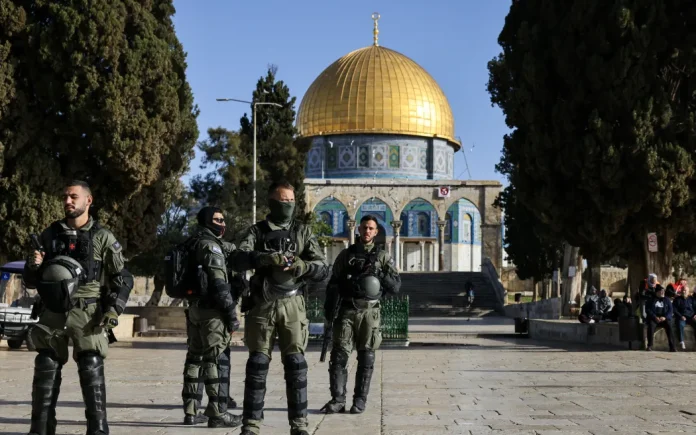As thousands of Muslim worshippers entered the Al-Aqsa Mosque compound in the Old City of Jerusalem to pray on the first night of the holy month of Ramadan on Sunday, police scuffled with some worshippers at the entrance to the flashpoint Temple Mount site, according to The Times of Israel.
Police were also accused of refusing to allow some Israeli Arabs to enter the site, in violation of Prime Minister Benjamin Netanyahu’s pledge to ensure free access for Muslim citizens.
According to police officials, “increased inspections were carried out in the area” to identify threats and “prevent potential criminals, instigators and violators of public order, for the sake of public peace and security, and the proper observance of Ramadan prayers.”
Last week, Netanyahu promised that the number of worshippers allowed to pray at Temple Mount during the first week of Ramadan would be the same as in previous years, with no restrictions imposed on Israeli Arabs.
However, a large part of the Arab population in Jerusalem does not have Israeli citizenship and may therefore be subject to stricter limitations. Coexistence organisation the Abraham Initiatives claimed that some citizens were actually blocked, accusing the police of ignoring Netanyahu’s directives.
Netanyahu has to impose order and calm surrounding Al-Aqsa. The numerous reports of blocking entrance to Israeli citizens on the first night of Ramadan stand in complete contrast to the decision made by the prime minister.
Police Commissioner Kobi Shabtai reportedly sought to limit attendance “in the initial stage” of Ramadan, believing that young Arabs, whether Israeli or from East Jerusalem, were the main “agitators.”
According to the report, thousands of Muslim worshippers prayed at the site on Sunday, and the number is expected to grow in the coming days, reaching tens of thousands on Friday.
Thousands of police were deployed in the narrow streets of Jerusalem’s Old City, where tens of thousands of worshippers were expected each day at the Al-Aqsa Mosque compound, the third holiest site in Islam. The complex is located atop the Temple Mount, the holiest place in Judaism, where two biblical temples used to stand.
The holy month of Ramadan, during which those who observe abstinence from food and water from sunrise to sunset, marks a period of religious reflection, family gatherings and alms-giving across the Muslim world.
Israeli security officials are concerned that Muslim anger over the war in Gaza could reach a peak during Ramadan, leading to disturbances. Earlier, Hamas called the 7 October attack in Israel, in which some 1,200 people were killed and about 250 taken hostage, Operation Al-Aqsa Flood in an attempt to link the actions in southern Israel to the holy site of Jerusalem.
Earlier on Sunday, police claimed that terrorist groups were trying to foment unrest in the capital ahead of Ramadan by spreading “false information regarding the reality in Jerusalem, the Old City and in particular the Temple Mount.” The statement added that 20 East Jerusalem residents had been arrested in the past fortnight on suspicion of incitement and support for terrorism.
